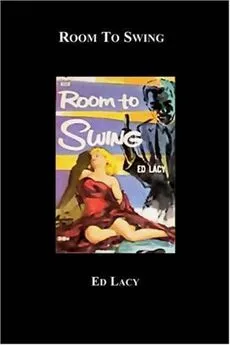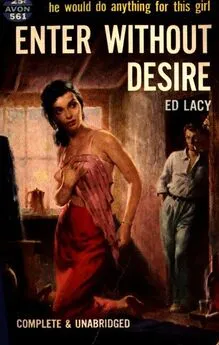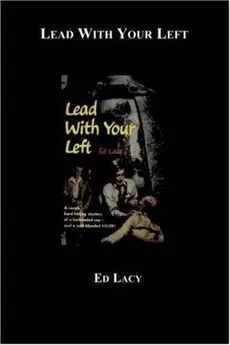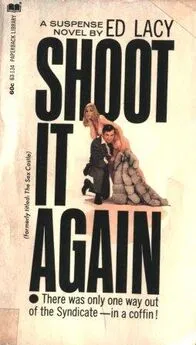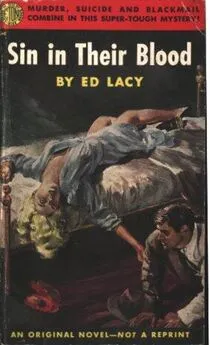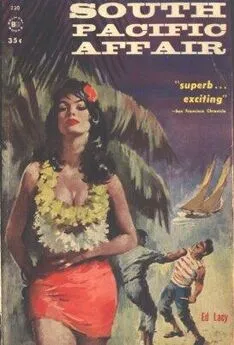Ed Lacy - Room To Swing
- Название:Room To Swing
- Автор:
- Жанр:
- Издательство:неизвестно
- Год:неизвестен
- ISBN:нет данных
- Рейтинг:
- Избранное:Добавить в избранное
-
Отзывы:
-
Ваша оценка:
Ed Lacy - Room To Swing краткое содержание
Room To Swing - читать онлайн бесплатно полную версию (весь текст целиком)
Интервал:
Закладка:
“I always tell you anything flashy isn't any good,” the old lady mumbled.
I undressed and stretched out on the bed, feeling wide awake. I lit my pipe and thought what an odd place Bingston was—South and yet not really South. That cop ready to break my head over a simple thing like a cup of coffee, yet when he asked about the Jag he had sounded as friendly as could be. And a chick like Frances, bitter and tough in her own way, yet sticking her neck way out to help me. Why? What was her why? That farmhouse—a little world of its own. And how did a young girl like Harry's wife take to living way out in the country, without electricity, probably no plumbing? Or Harry, how could he return to nothing after seeing California, the big cities, while in the army? If he'd seen Paris, London, Rome—would he still have returned? Sybil would raise hell at the very idea of living there. Me too, probably. Yet, in a way it was a far cleaner world than Harlem, or a big city. There wasn't any Mrs. James being dunned and cheated, or TV programs capitalizing on someone's misfortune to sell drugs. Kay and Bobby, they would seem like people from another planet— out on the farm.
In a sense Uncle Jim was smart—no papers, TV, probably the battery radio didn't work most of the time. Hardly ever saw a white face either. Maybe that was worth kerosene lamps and chicken smells. They reminded me of a Negro couple I once met, middle-aged schoolteachers. They had— maybe still have—an old apartment up in the Bronx. Every summer they both went to Paris and during the winters, the moment they entered their apartment, they spoke only French, ate French food, read Paris newspapers.... Soon as they entered their apartment they were no longer Negroes in the Bronx, but back in Paris. Without realizing it, Uncle Jim had done the same thing on his farm, had...
Then it hit me—like when you miss a hard tackle and the earth comes out and pounds everything out of you. I was lying here and thinking about the farm and Bingston as if I was a tourist, a spectator... as if Z wasn't wanted for murder!
Fear gripped me so hard I had a cramp. What was I really doing here in Bingston, playing detective to the killing in this sleepy town? In fact, was there an answer? Damn, if only I hadn't hit that cop. Suppose I'd let him take me in, told my story—after all, what motive did I have for killing the jerk? With their labs and men, the police would have found the real killer. At least there would be pros working on the case.
But would they have worked on it? Hell, they could say I was sore at Thomas for that coffeepot stuff, came back to kill him. Anything made sense—to whites—when a coloured man was involved. A jury wouldn't take my word either.... Hell, what was the point in all this if thinking? No one stands still for a pistol whipping. I had belted a white cop, and I was in this strange little Jim Crow town, with a few bucks, wasting precious time being philosophical about a lousy farm. I was doing nothing for myself. The trouble was I didn't know how I could do myself any good. I was a busher playing in the big league.
To my surprise I dozed off, had a good night's sleep. The next thing I knew the sun was hitting my face. It was nine o'clock and I felt full of pep. I washed up, considered shaving with the mailman's old-fashioned straight razor hanging beside the medicine chest, then dressed and went downstairs.
Mrs. Davis was in an old print dress, dusting, some sort of crazy lace cap on her gray head. She told me Frances and Mr. Davis had been gone for hours. “We don't sleep our lives away here.” I could have told her she didn't know how much she slept away her life but instead I stashed away one of those big country breakfasts—about a million calories in sausages, eggs, and wheat cakes swimming in syrup and butter. The old lady politely grilled me about my family, my busted nose, how long was I staying, had I ever been married. She had coffee with me, telling me the trouble she had with Frances. “That child has such queer ideas, I mean, the way she won't do a thing with her hair, or use powder.”
She wanted somebody to talk to and told me about her first child, who had died because she had waited too long to stop working, how she hoped the son at college would enter medical school after he did his army time.
When I finally pushed myself away from the table at ten, she told me, “I expect money in advance for room and board. Since I owe you a dollar, that will be three dollars for today and tonight.”
I gave her three bucks, said I was going to see the countryside and would be back by noon.
“I'll have lunch waiting. Please be careful, Mr. Jones. Remember the customs down here. You know.”
I said I knew. The ancient Chevvy shook like a baby's rattle and still stunk, but the motor sounded okay. I stopped “downtown” for a paper, a change of underwear, a razor and toothbrush, then took off for ole Kentucky. There wasn't anything new in the paper, a rehash of yesterday's account. That didn't mean a thing, the police only give out the news that suits them.
It was a clear day, almost warm, and like a moron I was full of good spirits. I took off my burberry, brushed it with my hand, tried to brush the dirty seat with the newspaper, and gave the Chevvy gas. I drove for about a half hour, passing some pretty country. I passed through a few wide-spots-in-the-road, one-store villages, wondered where I was. When I saw a gas station I drove in, asked a young white fellow, “Can you tell me how to get to Kentucky?”
He stared at me; maybe he was looking at my Countess Mara tie. He said, “You must be new around here, boy.”
“Yeah—sir.” I almost gagged on the last word. Was it as bad as this for guys in the army to “sir” me?
“You're in Kentucky now. Where you going to?”
“Why... Louisville.”
“Better gas up, boy, you got a long ride ahead of you,” he said, and started giving me directions. He put in five gallons, told me it was $1.65.
As I took out my wallet I glanced back at the pump meter and his long face flushed as he asked, “What's wrong, boy, don't you take my word?”
I damn near ripped the wallet, I gripped it so hard. Then I gave him a sickly grin as I handed a five-buck bill out the window, said, “I was only looking around to see if you had a pay phone here, chief.” I could see a phone booth next to the office; I would have had to be blind not to see it.
“Oh,” he said, relieved. As he gave me my change he added, “Keep going down this road a piece; you'll see a dirt road on your right after about a mile. Make a left on that for couple hundred yards. There's a coloured store there.”
“Thank you, sir,” I said, and drove off.
The “coloured” store was an enlarged shack with dusty windows that looked like a mild wind would take it apart. Inside there were several rows of canned goods behind a wide counter, a juke box, a wall phone, two homemade tables, and against the rear wall bottles of beer and soda were floating in a washtub full of ice.
A slim fellow with a small sharp face, light brown skin, and wearing worn overalls was leaning on the counter, playing with an empty pop bottle. Behind the counter there was a joker about six-five and at least 350 pounds of fat. But it was fairly well distributed and he carried it so well he looked like an overpadded football player. His face was the size of a pumpkin, dirty tan in color, with a knife scar down one cheek. His oily hair was plastered on his big dome under a stocking cap, and the wool plaid shirt and dungarees he wore must have been made of iron—to withstand the strain of his fat.
When I came in, Slim merely glanced at me out of the corner of one eye, while Fat-stuff asked, “New around here, ain'tcha, boy?”
“Yeah, I'm new and I've heard all the boying I want for the morning. Give me a dollar's change, I want to use your phone.”
He ran his eyes over me and didn't move. After a second he said, “I don't like no dark boys come busting into my store, asking me to do this and that.”
For a second I wanted to reach over the counter and take this fat joker apart, then I relaxed, thinking: Sure, I'd be talking big at the front gate because he's coloured. But I kept my mouth going like Charlie McCarthy sirring that white jerk at the gas station. Be too easy, too ofay, taking it out on this tan slob. I put a dollar on the counter, told him, “Heavy, I don't know you, you don't know me—so don't give me a hard time over nothing. I only came in to make a call. Or don't you have a dollar's change?”
“Sure I got a buck's change. I can change a hundred-buck bill too—any day of the week. Can you?”
“No,” I said, patiently.
“That's what I thought. Never saw a man in fancy clothes that had a full pocket.” He decided he'd made whatever point his fat head was bent on proving, dug into his pocket and slapped four quarters on the counter. I walked over to the phone, taking out all my loose change. I had the phone deal figured—I'd reach Sybil at the public phone in the employee's lounge, the way I usually called her to say I'd pick her up. Seemed to me there was no chance of it being traced. With Fatso and Skinny not even making a pretense of not listening, I gave long distance the number, talking in as low a voice as I could. It hardly seemed a second before a girl answered. When I asked for Sybil the girl said she was working. I asked if I could reach her and the girl said to hold on, she'd see.
Another few seconds and the girl said she was still trying to find Sybil. I waited a couple of minutes. The operator told me to signal through. The tub of lard back of the counter remarked to nobody, “Sure an expensive call you making, Slick. I never seen a man talk so little.” He chuckled like a jackass. “All that nothing for so much money.”
Finally I heard Sybil's sharp, “Who is this?”
“Hello hon. How's things?”
In a voice low, mad, and hysterical she said, “Touie Moore, you're going to cost me my job! The police came to my house last night!” She gulped as she said the word “police.”
“And I'm sure a police car followed me to work this morning! Trooping into my house... and if the company learns—”
“Slow down, honey. What did the boys say, what did they want?”
“They asked if I knew where you were, when I'd last seen you. That's all.”
“That's all? Didn't they say anything more? Did they say what—that is—why—they were interested in this fellow?”
“What are you double-talking about? I told you all they said. I was never so embarrassed in my life. I thought it might be you and I was still undressing when I opened the door—you should have seen the way they looked at me.”
“What did you tell them?”
“The truth! That I hadn't seen you since the day before, had no idea where you were. Touie, I don't know what you're mixed up in but if you had a normal post-office job—”
“You don't know? Honey, haven't you been reading the papers, watching TV as usual?”
“You louse, are you checking up on me? You have your—”
“No, no, I—eh—didn't mean it like that.”
“What's wrong with you? You're talking in riddles.”
“I'm at a public phone.”
“When am I going to see you?”
“I don't know. Soon, I hope. I'll be in touch.”
“You listen, Touie Marcus Moore, you pay me back my money. All of it! I must have been crazy letting you take that money. God knows what you're doing with it.”
“I'm buying an oil well for Kim Novak, what else would I be doing with the money? I'll call again. Now take it easy and don't worry.”
“I have ninety-four reasons why I worry—!”
Читать дальшеИнтервал:
Закладка:
